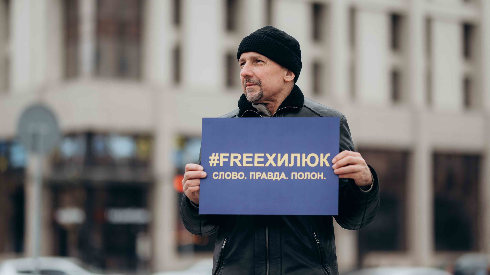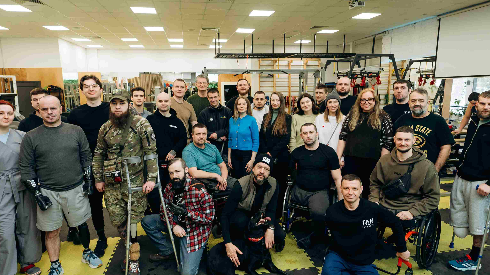
"Life in Occupation: Media Bridge with the TOT": the national campaign of dialogue and solidarity with Ukrainians living or having lived under temporary occupation comes to an end
In March, the national campaign "Life under Occupation: Media Bridge with TOT", launched by 1+1 media group in January 2013 with the support of the Smart Angel charity, will come to an end.
The project brought together the stories of people who experienced the realities of life under the temporary occupation of Russia. Starting in January, as part of the two-month campaign, TSN aired 16 TV stories on this important topic in the United News marathon and in the Breakfast with 1+1 programme on 1+1 Ukraine and TET.
Thanks to the project, people from the territories controlled by Ukraine not only learn about the current situation in the towns and villages temporarily occupied by Russia, but also express their support for their compatriots. Thus, the campaign highlighted the realities of life in Mariupol (Donetsk region), Izyum and Vovchansk (Kharkiv region), Berdiansk and Melitopol (Zaporizhzhia region), Skadovsk and Nova Kakhovka (Kherson region), Sumy, Snihurivka (Mykolaiv region), Sievierodonetsk and Luhansk region, as well as Crimea.
In a special material, we summarise the key results of the campaign and talk to the project team.
"Thanks to the joint efforts of 1+1 media, Starlight Media, and Mega Alliance, Ukrainians heard real stories from fellow citizens who told about their experiences of living under occupation in the first person in a series of interviews. In turn, Ukrainians from Mariupol to Lysychansk heard words of support and understanding, and received advice on how to behave to protect themselves and their loved ones, how to get truthful information under occupation, how to act in case of forced departure, and other practical tips," the team says.
Roman Andriyuk, producer of the project from 1+1 Breakfast, notes that the morning show is a point of reference for Ukrainians, and the implementation of the Life Under Occupation project has become a kind of mission for the team: "The personal stories of Ukrainians helped us to see life in the temporarily occupied cities from the inside. They are forced to live through the horrors of occupation, but even under such conditions, most believe that they will soon be able to return to a free life. The project's goal was to support such Ukrainians and make it clear that Ukraine is with them, that every Ukrainian feels and sees their problems."
Nadiia Onenko, TSN project producer:
"We were motivated to take on the project by the high interest in society in life in the occupied territories. Due to pressure and persecution, information about life in the occupied territories is extremely scarce. Those people who do not have relatives there can only learn what is happening in Mariupol or, for example, Berdiansk from the media. It is especially important for them that these are media that provide verified information and do not distort it for the sake of hype and manipulation. This was also a challenge for us, so we checked each character's background and reputation.
I am convinced that projects like this help those Ukrainians who are temporarily in the occupied territory to convey their experiences and not feel left behind. And everyone else can understand how people who are forced to live under occupation survive and what challenges they face."
About the real stories of Ukrainians in the project
Ukrainians testify that the occupation is accompanied by numerous human rights violations and the deliberate destruction of Ukrainians' living space, from their homes to the right to receive Ukrainian education. Such stories also revealed the role of some local leaders during the war:
"In April, the occupation authorities were already established in neighbouring communities. They had also recruited the so-called occupation police in the cities, and I was still in the community, believing that I could not just leave the population that had elected me without any visible or valid reason," said Stanislav Zakharevych, head of the Sofiyivka village council in Zaporizhzhia region, who survived 34 days of captivity. When the occupation authorities came to power, Mr Zakharevych refused to cooperate with the Russians and remained in his job until the end. Only after his captivity did he decide to leave.
Olga Zhydkova, a resident of Sievierodonetsk and a volunteer, expressed her opinion on why residents of Luhansk region do not always leave the occupation. "The city is destroyed. According to my calculations, about 90% of it is destroyed. It was my neighbourhood where I lived. It is simply gone. There are only sketches of houses." Despite the total destruction, people continue to live in the city. Olha says that most of them do not leave because they are afraid of losing their property due to mass looting and appropriation of Ukrainians' property.
"There are searches with some frequency, there are detentions with some frequency. Resistance on the peninsula is an attempt to remain who you are. Resistance on the peninsula is about preserving critical thinking, resistance on the peninsula is about preserving your identity," Natalia, a resident of Crimea, expresses her position in a story on 1+1 Breakfast.
As for education in the occupation, Ihor Serdyuk, director of a vocational school in Nova Kakhovka, told TSN that some children are now forced to study Ukrainian programmes almost underground. "They demanded only one thing - cooperation. Or they said that you will die here, in this basement," - after being imprisoned for refusing to transfer his school to the Russian education system, Mr Serdyuk had to go abroad, where he continues to teach his students.
Sometimes these personal narratives contained stories about resistance to the occupiers by Ukrainians and the true realities of destruction in cities, intimidation and violence, the occupiers' attitude to local residents and attempts to root the "Russian world" by any means necessary. Therefore, some of the subjects of the stories were concerned for their own safety and the safety of their families and asked to hide their faces or did not dare to reveal their real names, while some Ukrainians did not dare to appear on air.
This series of TV stories received mostly emotional responses from social media audiences. Viewers are empathetic to the difficult stories of Ukrainians, expressing admiration for their heroic deeds and the courage of those who dared to openly share their experiences of living under occupation with the media. In total, the project authors managed to reach an audience of 13 million people.
Heroes' feedback on the importance of the campaign for them personally
After watching the TV spots, relatives and friends of the heroes express their gratitude for telling the truth about the occupation. "Many people said that I voiced what they did not dare to say out loud. It will be hard and long, but we will definitely come back - strong and renewed," says Olga from Sievierodonetsk, whose interview was watched by her friends and acquaintances.
The doctors from Snihurivka Hospital who risked their lives to save Ukrainian defenders receive words of gratitude and respect from their colleagues and local residents as true heroes of their city. "People learn the truth and thank us. Yesterday, a seven-year-old boy recognised me as the one on TV, came up and shook my hand," says Mr Valentyn, the subject of the story about the heroic staff of Snihuriv hospital.
For other Ukrainians invited to the interview, it was an opportunity to anonymously explain their choices and difficult decisions during the war, such as a lady from Berdiansk whose family remained in the TOT and has its own agricultural business with hired workers. "We are farmers. My husband works on the land. We have employees, we can't leave anyone behind and leave, because everything will be taken away," Natalia, a resident of Zaporizhzhia region, told 1+1 Ukraine.

